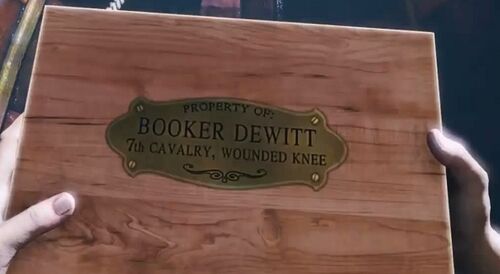WARNING: This post contains major spoilers for BioShock Infinite, including its conclusion!
READ AT YOUR OWN RISK!
If you bought a retail copy of BioShock Infinite, you will notice an alternative jacket design on the reverse side of the game's cover. Bathed in red, a scratchy illustration of Songbird perches above Columbia. It looks like an old-timey poster for the world of Columbia, which itself is steeped in history. The two-sided cover is a brilliant analogy for the game itself: beneath the traditional shooter lies a genuine and disturbing story about American history and the mythologies on which ideologues build nations.
Wounded Knee
Anyone interested in Westerns, or anyone from the US who paid attention in American History class, knows the legends surrounding the battle of Wounded Knee. On December 29th, 1890, over 150 men, women, and children of the Lakota Soux American Indian tribe were slaughtered by a battalion of American troops. It marked the last "battle" of the American Indian Wars, but historians generally agree it was a slaughter, not a fight. Many were killed outright, women and children included, while others were hunted down by soldiers on horseback.
While actual details regarding how the event began are contested, the fact the massacre at Wounded Knee was just a capstone to a history of slaughter and domination is far more important. The event took place well after the infamous Trail of Tears. American Indians had already been the targets of what some historians consider genocide, and numerous treaties had been signed and ignored.
The "battle" of Wounded Knee is as much a dark spot on American history as it is on Booker DeWitt's conscience in BioShock Infinite. The event is mentioned time and time again and plays a crucial role in the events of the game. Booker's entire moral struggle is the linchpin to the events of the game and hinges upon his experience at Wounded Knee.
His guilt over his role in the slaughter, among other experiences, drove him towards the pivotal baptism. Throughout the game, Elizabeth asks Booker whether or not they can atone for the things they've done, and Booker consistently reflects guilt and self-hatred for his position at Wounded Knee.
Comstock, on the other hand, mythologizes history. In the Hall of Heroes, an elaborate and clearly fictionalized tourist set depicts Wounded Knee as a high-point of American exceptionalism, a fierce battle between the savage hordes of American Indians and brave American troops. As the motorized patriot says in the hall of heroes, "With hue and cry, with hatchet and red, they danced amongst our noble dead. But whom our soldiers took the field, the savage hordes could only yield."
Creating Myths
Comstock commits the same level of mythologizing in his portrayal of the Chinese Boxer Rebellion, itself a real blemish on American history built on years of imperialism and foreign influence on a region undergoing sudden economic and cultural shifts. Of course I don't mean to justify the Boxers, who themselves built nationalistic mythologies that rationalized the slaughter of civilians. Still, the very foundations of Columbia are built on intentionally reconstructed versions of the past.
Of course American culture also mythologizes actual events. After Wounded Knee, twenty Medals of Honor were bestowed to American troops, the highest honor the Army can give to soldiers. The Boxer Rebellion was intimately tied to American nationalism at the time. Indeed, many of the posters scattered around Columbia reflect common notions about the Chinese or are pulled directly from archives.
The Pinkertons, the largest private security firm in the United States for some time, have also become a part of Western mythology. They appear as both allies and enemies in countless films, they hunt down outlaws like Jesse James and Butch Cassidy. They represent the inevitable civilizing reach of the American Government into the "Wild West."
Rarely does pop-culture reference their numerous union-busting actions. During the late 19th and early 20th centuries, the Pinkertons were goons for hire, selling their services to wealthy businessmen to put down labor strikes. They would infiltrate organizations, threaten and beat labor activists, and were partially responsible for the Homestead Strike disaster, one of the most violent labor disputes in the American history.
The Politics of BioShock
Hands down, BioShock Infinite is one of the bravest games I have ever played. The game puts players into a world where historical rhetoric is real and alive. Without ever lecturing players, it references America's checkered past and tied the game narrative into a larger story about truth and fiction. From the Vox Populi's violent labor protests to Cornelius Slate's hatred of Comstock, history comes back time and again to undermine Comstock's hateful Utopia.
Booker is a perfect mirror for Columbia itself. The reality of Columbia is built on false memories, even the early idea that America's founding fathers were somehow agents of God. Booker's reality is also built on false memories, in this case literally made by himself in an endless loop of denial, lies, and greed. Behind this misremembered past is actual, real, lived, history that includes racism (did you catch the reference to Phrenology, the practice of justifying racist beliefs by by measuring skull sizes, in the game?), religious fanaticism, tyrannical nationalism, and subjugation (also reflected in the control of women represented by Elizabeth, Daisy Fitzroy, and Lady Comstock).
Yes, BioShock Infinite is an entertaining shooter and, for players looking for that alone, it's fine to enjoy it only as a game. But it's also a story about history, memories, and storytelling itself. It's about the inherent poison of constructed mythologies, be they the foundations of Columbia, Comstock, or America. BioShock Infinite is a complicated, wondrous, and bravely political game by one of the best designers alive and just like American History, it is rife with stories, constants, and variables.




